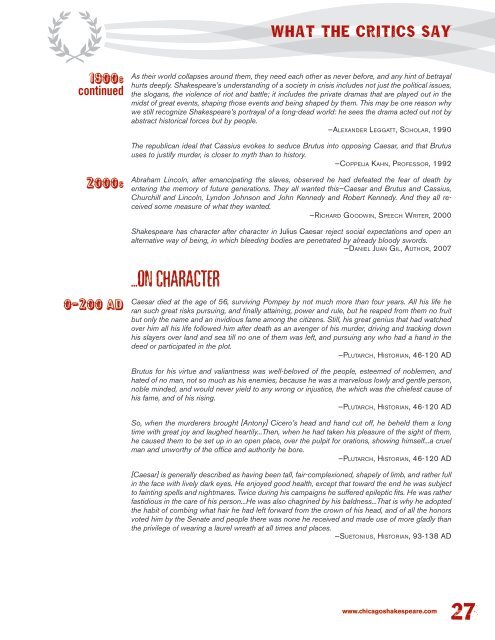Julius Caesar • 2013 - Chicago Shakespeare Theater
Julius Caesar • 2013 - Chicago Shakespeare Theater
Julius Caesar • 2013 - Chicago Shakespeare Theater
You also want an ePaper? Increase the reach of your titles
YUMPU automatically turns print PDFs into web optimized ePapers that Google loves.
1900s<br />
continued<br />
2000s<br />
0-200 ad<br />
WHAT THE CRITICS SAY<br />
As their world collapses around them, they need each other as never before, and any hint of betrayal<br />
hurts deeply. <strong>Shakespeare</strong>’s understanding of a society in crisis includes not just the political issues,<br />
the slogans, the violence of riot and battle; it includes the private dramas that are played out in the<br />
midst of great events, shaping those events and being shaped by them. This may be one reason why<br />
we still recognize <strong>Shakespeare</strong>’s portrayal of a long-dead world: he sees the drama acted out not by<br />
abstract historical forces but by people.<br />
—alexanDer leGGaTT, sCholar, 1990<br />
The republican ideal that Cassius evokes to seduce Brutus into opposing <strong>Caesar</strong>, and that Brutus<br />
uses to justify murder, is closer to myth than to history.<br />
—Coppelia kahn, proFessor, 1992<br />
Abraham Lincoln, after emancipating the slaves, observed he had defeated the fear of death by<br />
entering the memory of future generations. They all wanted this—<strong>Caesar</strong> and Brutus and Cassius,<br />
Churchill and Lincoln, Lyndon Johnson and John Kennedy and Robert Kennedy. And they all received<br />
some measure of what they wanted.<br />
—riCharD GooDWin, speeCh WriTer, 2000<br />
<strong>Shakespeare</strong> has character after character in <strong>Julius</strong> <strong>Caesar</strong> reject social expectations and open an<br />
alternative way of being, in which bleeding bodies are penetrated by already bloody swords.<br />
—Daniel Juan Gil, auThor, 2007<br />
...ON CHARACTER<br />
<strong>Caesar</strong> died at the age of 56, surviving Pompey by not much more than four years. All his life he<br />
ran such great risks pursuing, and finally attaining, power and rule, but he reaped from them no fruit<br />
but only the name and an invidious fame among the citizens. Still, his great genius that had watched<br />
over him all his life followed him after death as an avenger of his murder, driving and tracking down<br />
his slayers over land and sea till no one of them was left, and pursuing any who had a hand in the<br />
deed or participated in the plot.<br />
—pluTarCh, hisTorian, 46-120 aD<br />
Brutus for his virtue and valiantness was well-beloved of the people, esteemed of noblemen, and<br />
hated of no man, not so much as his enemies, because he was a marvelous lowly and gentle person,<br />
noble minded, and would never yield to any wrong or injustice, the which was the chiefest cause of<br />
his fame, and of his rising.<br />
—pluTarCh, hisTorian, 46-120 aD<br />
So, when the murderers brought [Antony] Cicero’s head and hand cut off, he beheld them a long<br />
time with great joy and laughed heartily...Then, when he had taken his pleasure of the sight of them,<br />
he caused them to be set up in an open place, over the pulpit for orations, showing himself...a cruel<br />
man and unworthy of the office and authority he bore.<br />
—pluTarCh, hisTorian, 46-120 aD<br />
[<strong>Caesar</strong>] is generally described as having been tall, fair-complexioned, shapely of limb, and rather full<br />
in the face with lively dark eyes. He enjoyed good health, except that toward the end he was subject<br />
to fainting spells and nightmares. Twice during his campaigns he suffered epileptic fits. He was rather<br />
fastidious in the care of his person...He was also chagrined by his baldness...That is why he adopted<br />
the habit of combing what hair he had left forward from the crown of his head, and of all the honors<br />
voted him by the Senate and people there was none he received and made use of more gladly than<br />
the privilege of wearing a laurel wreath at all times and places.<br />
—sueTonius, hisTorian, 93-138 aD<br />
www chicagoshakespeare com 27




